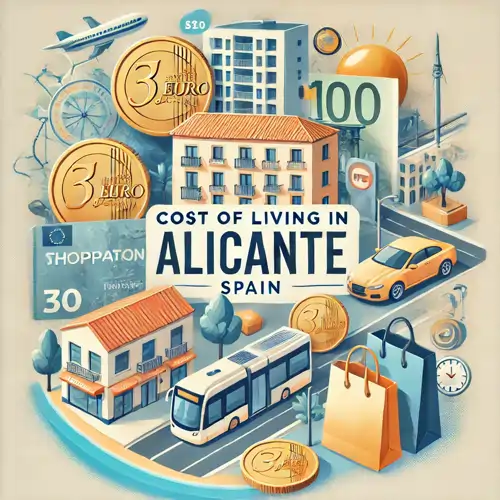Challenges and Solutions for Moving to Alicante
Many people considering a move to Spain wonder: how expensive is it to live in Alicante? What costs should be expected for rent, utilities, food, and transportation? Potential expats and investors often have doubts about the real expenses in a place that seems ideal for a comfortable life by the sea. Many also worry about enrolling children in schools, language barriers, and job hunting. In this article, we will examine the main expenses, outline an estimated monthly budget, and discuss the key aspects of life in Alicante.
Below are the main concerns that most prospective residents face:
- Uncertainty about actual living costs, from rent to food expenses;
- Differences in housing prices across various neighborhoods;
- Language barriers when dealing with utility services and job searches;
- Challenges in selecting the right school for children;
- Complexities of the healthcare and insurance system;
- Finding job opportunities outside the tourism sector.
These challenges can be addressed by:
- Carefully planning a budget in advance, considering all expenses;
- Choosing the right neighborhood based on pricing and infrastructure;
- Learning basic Spanish ahead of time to simplify administrative processes;
- Researching school rankings and educational options, as well as possible residence permits or student visas;
- Selecting the best health insurance if opting for private healthcare;
- Analyzing the job market and considering remote work if local job opportunities are limited.
Housing: Renting and Buying Property
Renting a Home in Alicante
The cost of renting in Alicante varies significantly based on location, apartment size, and amenities. In the city center, rent can range from €600–1000 per month for a one-bedroom apartment and €850–1800 for a three-bedroom apartment. In suburban areas, prices drop to €500–800 for one-bedroom units and €700–1200 for three-bedroom apartments. In more remote areas or neighboring towns, it is sometimes possible to find options starting at €450–500 per month, though these properties tend to be smaller and offer fewer amenities.
Key tips when searching for a rental:
- Ensure that rent does not exceed 30-35% of your income for financial stability;
- Compare different neighborhoods based on price, infrastructure, amenities, and safety;
- If possible, sign a long-term contract (at least one year) to secure stable rental rates and avoid eviction after a short-term stay.
Buying a Property
If planning to buy property, prices per square meter in Alicante’s city center range from €2100 to €3600. In the suburbs, prices start from €1200 to €2500 per m². Mortgage interest rates typically range from 3.5–4% annually. However, foreigners without a Spanish credit history may be required to make a higher down payment—up to 30–40% of the property's value.
For families planning long-term residence, purchasing an apartment can be a cost-effective decision over a 10–15 year period. However, it is essential to research taxation and property maintenance costs beforehand.
Utilities and Telecommunications
The average cost of utilities for an 85 m² apartment ranges from €80 to €180 per month, covering electricity, water, heating, and waste collection. Fiber-optic internet (100 Mbps or more) costs around €20–40 per month. Mobile phone plans vary depending on data usage, with prices between €8 and €25 per month.
Transportation Costs and Owning a Car
Public Transportation
Alicante has a well-developed bus and tram network: a single ticket costs €1.45–1.50, while a monthly pass is approximately €30–40.
Owning a Car
If purchasing a mid-range car such as a Volkswagen Golf, expect to pay around €20,000–25,000. Fuel prices range from €1.53 to €1.70 per liter, and annual insurance costs between €300 and €800.
Conclusion: Is Moving to Alicante Worth It?
Alicante attracts many people with its mild climate, seaside location, and relatively affordable housing prices. For many, this means enjoying a Mediterranean lifestyle while spending less than in major Spanish cities. However, it is essential to consider potential employment difficulties outside the tourism sector and choose a neighborhood that balances safety and infrastructure.
If cost of living is a primary factor in your decision to move to Spain, Alicante is an excellent option: rent is more affordable than in Madrid or Barcelona, property selection is broad, grocery prices are moderate, and public transportation is efficient. Additionally, the city offers everything needed for a comfortable lifestyle: schools, medical centers, sports clubs, and cultural activities.
The key is to calculate your budget in advance, determine whether to rent or buy, assess job prospects, and consider the conditions for obtaining a residence permit. With proper planning, life in Alicante can be both financially viable and highly enjoyable.








